Today, I’m thrilled to welcome Suzi Stembridge, another British author who fell in love with Greece. As you know, I love discovering authors who write about my country so it’s my pleasure to present Suzi’s work to you today:
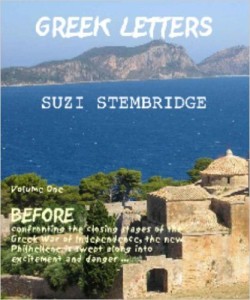
The GREEK LETTERS quartet is part of a series charting the fortunes and adventures of Rosalind, her ancestors, her partners and offspring and their family and friends, over two centuries, entitled “Jigsaw.”
In 1827 Samuel Carr leaves his home in Didsbury in Cheshire. This mild-mannered young man is completely oblivious that his spontaneous decision to travel to Greece, fighting for its independence, will have a huge effect on his descendants. His travels take him to the scene of the Battle of Trafalgar near Cadiz and on to witness the Battle of Navarino in the Peloponnese; scenes he never imagined in his wildest dreams – and the dreams of this sensitive young man are wild…
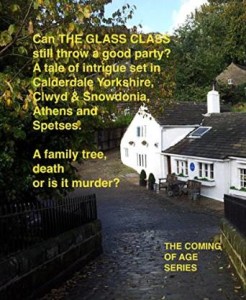
Set in Calderdale in West Yorkshire, Snowdonia in Wales, Athens and the island of Spetses in Greece. Death (murder or accidental?) stalks the middle-aged friends as they struggle to cope with their party life in the late nineteen-seventies. Failing marriages, affairs, intrigue and possibly alcoholism seem determined to undermine their pursuit of happiness and their careers in journalism and textiles. As they struggle to resolve their problems it is the discovery of a family tree which holds the secret to an astonishing denouement…
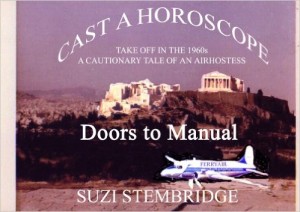
Rosalind Peters, known as Roz, is an air-stewardess in the early 1960’s; in the days when they were called air-hostesses. With a one hour induction, a training flight to Paris and an afternoon swotting from her manual, she is embarking on her first flight at night and she is solely responsible for thirty-six passengers on a Viking aircraft. The chief pilot of the small Yorkshire-based charter airline is her captain and in these days of fledgling package holidays her passengers are businessmen going to Hamburg to play hockey. It doesn’t take long for the sardonic captain, ex RAF and Berlin airlift, and seeming to the youthful Roz as middle-aged and corpulent, to size up the rooky learner…

Image from the book “GREEK PICTURES drawn with pen and pencil by J.P. Mahaffy M.A., D.D.” and published by The Religious Tract Society in London 1890.
Hello Suzi and welcome to my blog!
Hello, Fros! Thank you for inviting me!
What has inspired you to write JIGSAW?
Jigsaw comprises of two series: each of four books, which combine as Jigsaw to make one very long family historical novel. In 2003 we were running our tour operation company “Filoxenia” and the travel agency “Greco-file” and I broke my foot. I couldn’t get to the office. All over the house were remnants of half-finished novels, frustrating me because I longed to write. A computer wiz (these were early days) gave me an old-fashioned scanner. I took the enforced rest, with my leg up, to scan in (painstakingly) old typed sheets and sheets typed and corrected in pen – amazingly the scanner even had a go at the written words but jumbled up the typed words! I was off. Fantastic! These jottings seem to fit a time from the 1960s to the present and then once I retired a year later I added the GREEK LETTERS QUARTET: a 19th & 20th century prequel taking up the ancestors of the original protagonist Rosalind in CAST A HOROSCOPE & THE GLASS CLASS.
What other writing have you done? Anything else published?
I have always been writing, scribblings as a pre-school child, school magazines, book reviews for newspapers and travel articles. Someday, I told myself, I would have the opportunity to write novels.
I hear you’re supporting a charity at the moment via your book sales?
Yes, at least till March 31st I’ll be donating a percentage of my proceeds to the Calderdale Flood Relief Fund. The devastating floods in our area of West Yorkshire have wiped out homes and businesses – including our independent bookshop in Hebden Bridge.
It must be horrible for everyone, and so kind of you to do this. Which are your favorite authors, and what do you love about them?
I keep coming back to FROM THE HOLY MOUNTAIN by William Dalrymple. I loved this book before Syria imploded. Now it is priceless, with William’s beautiful descriptive writing taking the reader through the middle east to a Syria which was so fascinating I longed to visit it. Being a woman I am enthralled by Mount Athos, and that this begets the title of William’s book only highlights the poignancy of the present situation. Patrick Leigh Fermor, for example, is another writer influenced by Mount Athos and the Byzantium and I adore all Paddy’s other books which have influenced my own choice of locations. It was Prospero’s Cell by Lawrence Durrell which instilled a love of Corfu where we had our honeymoon in 1965 and where we explored the whole island (only dirt roads in those days). Naturally it is the scene for my psychological thriller, written under a pen name, the pen-name of my protagonist, Rosalind.
What genres do you read mostly, and what are you reading now?
I just love books: 19th century novels, travel books, novels by contemporary writers such as Ian McEwen and Edna O’Brien. I am currently reading her The Little Red Chairs, absolutely beautiful but shocking in its sexual abuse scene. I love biographies or novels based on real historical events. I have had enormous pleasure from the many diverse books in A Good Greek Read, all very interesting and surprising in their content; from Daphne Kapsali to yourself, from Kathryn Gauci to T.E. Taylor. My bedside pile of books to re-read includes War & Peace and The Forsyte Saga, which shows the power of the BBC to influence one’s reading, but I think The Marriage Plot by Jeffrey Eugenides will win!
Your reading pile sounds wonderful, and thank you for the mention. Are there any sites or writing tools that you find useful and wish to recommend?
I have just found Grammarly, even the basic free tool is very useful.
Funny you should say that; I discovered it yesterday! I love the Grammarly add on for Microsoft Office in particular. It is a wonderful free tool for checking manuscripts! Tell us about your website/blog, Suzi. What will readers find there?
My website www.greco-file.com is unusual. When we sold our business, “Filoxenia”, and retired, I didn’t want to lose touch with all the clients – mostly huge philhellenes –and so I continued to give free advice on where to travel within Greece. Twelve years on I suppose I still could but now it acts as a site to display the synopsis of the eight novels and a place for photographs of Greece.
If you could choose another profession, what would that be?
My head teacher wanted me to go on to University but my father was adamant that he would not pay (girls did not do that back in those days) and he was sure I would waste his money and just get married! She told him cuttingly, “Then she will just have to be a librarian or a researcher.” In both she might have been right, but I did get a degree with the Open University in my early 40s, of which I am extremely proud, which led to me setting up my own travel business to Greece called Filoxenia. This satisfied both the urge for traveling and for writing, with the creation of lavish brochures about the landscapes of coastal and mountain Greece. I thought I had created my dream job but to be honest I still just wanted to write history and fiction.
What are the things in your life that you’re most grateful for?
I am grateful, beyond measure, for family life, a small house in the country with more acreage than is usual on which to walk, preferably with a springer spaniel, the chance to travel . . . and apart from a quick trip across the pond in my youth this has mainly been round Europe. The travel business took my husband and me (we have been married fifty years!) to many countries in Europe and the Middle East and then all over Greece, the Peloponnese, Epirus, Thessaly, Macedonia and to unusual islands discovering remote locations for our clients. All these travels were building up primary source material for when I came to write and I am grateful for all the primary & secondary source material I had in family papers and my inherited library! We were lucky enough to build – and sell – a house in the Peloponnese with the most inspirational views and to make so many good friends in Greece. I think I am most grateful for the gift of literature and painting. I love to read, and in particular to write and to paint and for the good health to do all these things. All this led to inspiration for the novels, particularly the GREEK LETTERS QUARTET and of course, CAST A HOROSCOPE – the story of a rooky air-hostess in the early 1960s, which I was – but the book is not autobiographical.
You were a hostess, you say?
Yes, I flew for a tiny company out of Southend airport in Essex, and it was huge fun! The airline was called Tradair and the pilots were a bunch of demobbed RAF fresh from the Berlin Airlift – yes, that long ago! We flew to Athens, Rhodes, Crete, and also to the Middle East – Beirut, Cairo and Jerusalem, or anywhere in the Med.
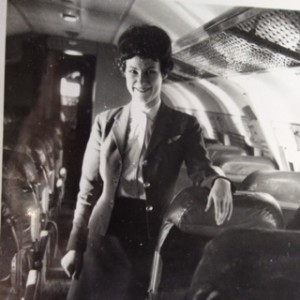
Wow! And how pretty you look in this picture! Thank you for sharing this, Suzi. What do you consider is the unique feature of your work?
I suppose more than anything it is the fact that the books interlink over time: the young philhellene traveling to Greece in 1827 arrives as the last naval battle fought with sailing ships to end the Greek War of Independence at Navarino is raging. In my opinion this is one of the most important events in modern history. The Philhellene’s adventures and those of his companions are played out against his growing dynasty. Eventually it is his great-great-granddaughter and her offspring and friends who inhabit the later books. I am proud that these novels begin in the early 19th century but come to a conclusion at a time the world is changing hugely. It is not just the uncertainties created by 9.11, space exploration, climate change, ISIS, North Korea; it is the huge advances of technology and medical science which will herald a new age and perhaps end of the values which have held sway over the last two hundred years. It was ever thus but we do seem to be not just at the end of a chapter, but an epoch.
Have you brought any other photos to show us today?
Yes, four photos from my travels around Greece, namely from Nafplio, Meteora, and two from the Peloponese.
Wonderful! Thank you for sharing, and for being here with us today. It’s been a pleasure.
It’s been a pleasure for me too, thank you very much, Fros!
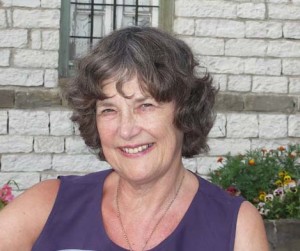
Suzi Stembridge was born in rural Yorkshire, UK, where she still lives in a small farmhouse on the Pennine Hills. She was educated in North Wales and the settings in some of her books reflect this and her Yorkshire heritage. However, it is Greece which influenced her most, which she first visited as a trainee air-hostess and to where she returned frequently throughout her life. She founded and ran three businesses – Girl Friday, Filoxenia, a specialist Greek Tour operator, and Greco-file. She is married with adult children. She has spent the last 10 years writing the series JIGSAW, unashamedly with a Greek bias.
Visit Suzi’s Amazon page US UK
Visit Suzi’s website
Visit Suzi’s blog
Twitter: https://twitter.com/SuziStembridge
Meet @SuziStembridge , British author turned Greek #greek #travel #ASMSG Share on XAre you an author? Go here to see how we can help you spread the word about your books!
Follow the blog (see right sidebar) to get notified of all future posts. Sign up to Effrosyni’s newsletter to receive her news and special offers (very sparse emails). Head over to Effrosyni’s Blog, where you’ll find delicious Greek recipes!

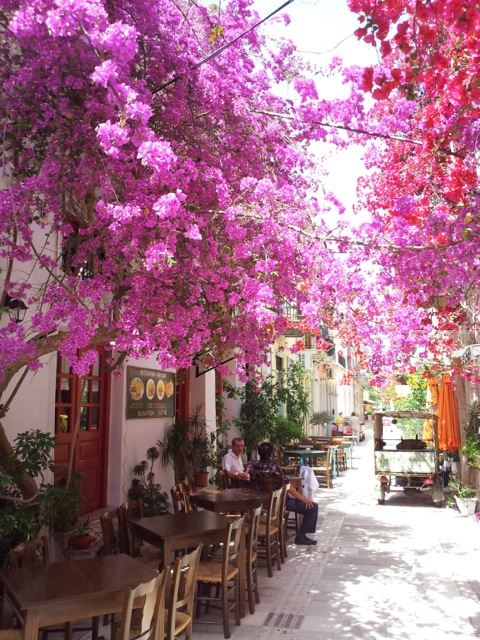
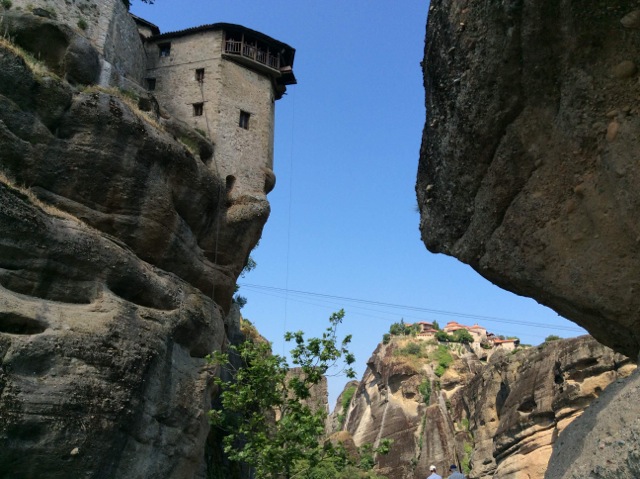
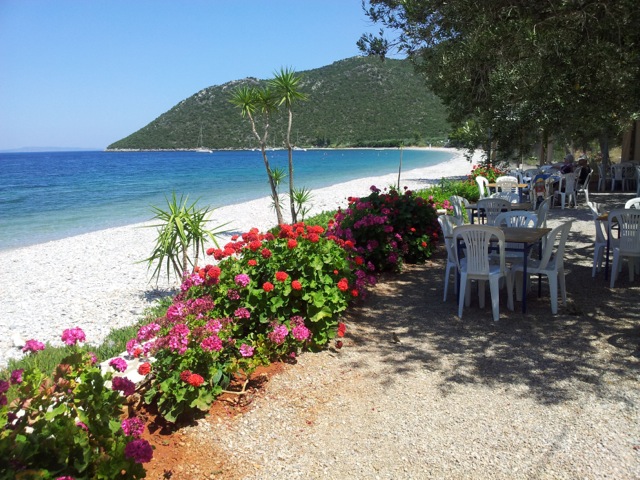
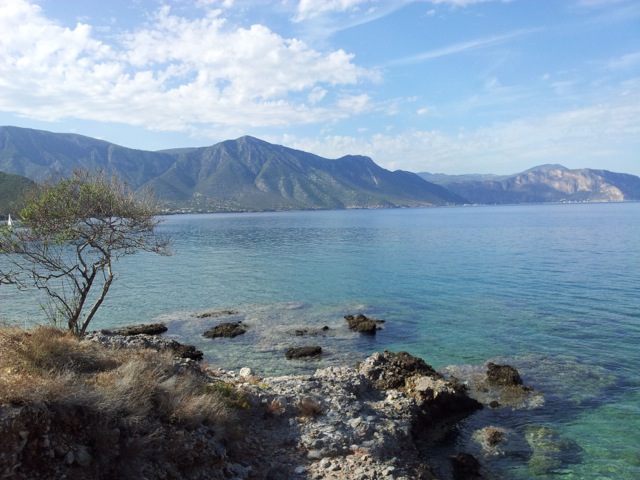

What a wonderful interview! And what a beautiful person! With such a lush life, full of diverse experience, I’m sure Suzi’s books are great, too! Thanks. Suzie and Fros!
Thank you for your kind comments, Maria. Yes, Suzi’s books sound absolutely fabulous 🙂
Fabulous interview Fros and Suzie. You’ve had such an interesting life, Suzie it calls for a memoir. Just think of all the wonderful material you have. X
Great idea, Yvonne! A memoir would be exceptionally interesting, especially the flying bit in the old glory days of civil aviation. Thank you for stopping by, Yvonne 🙂